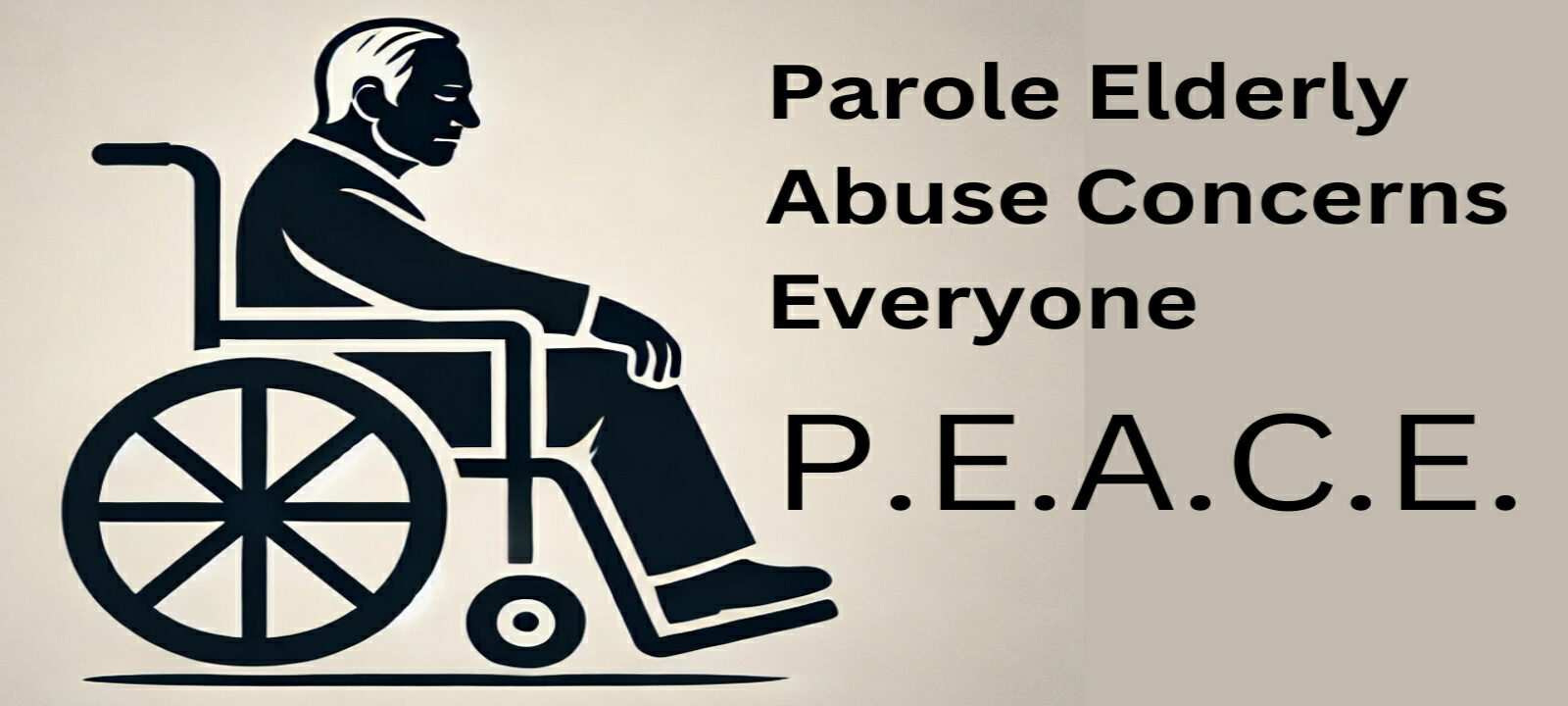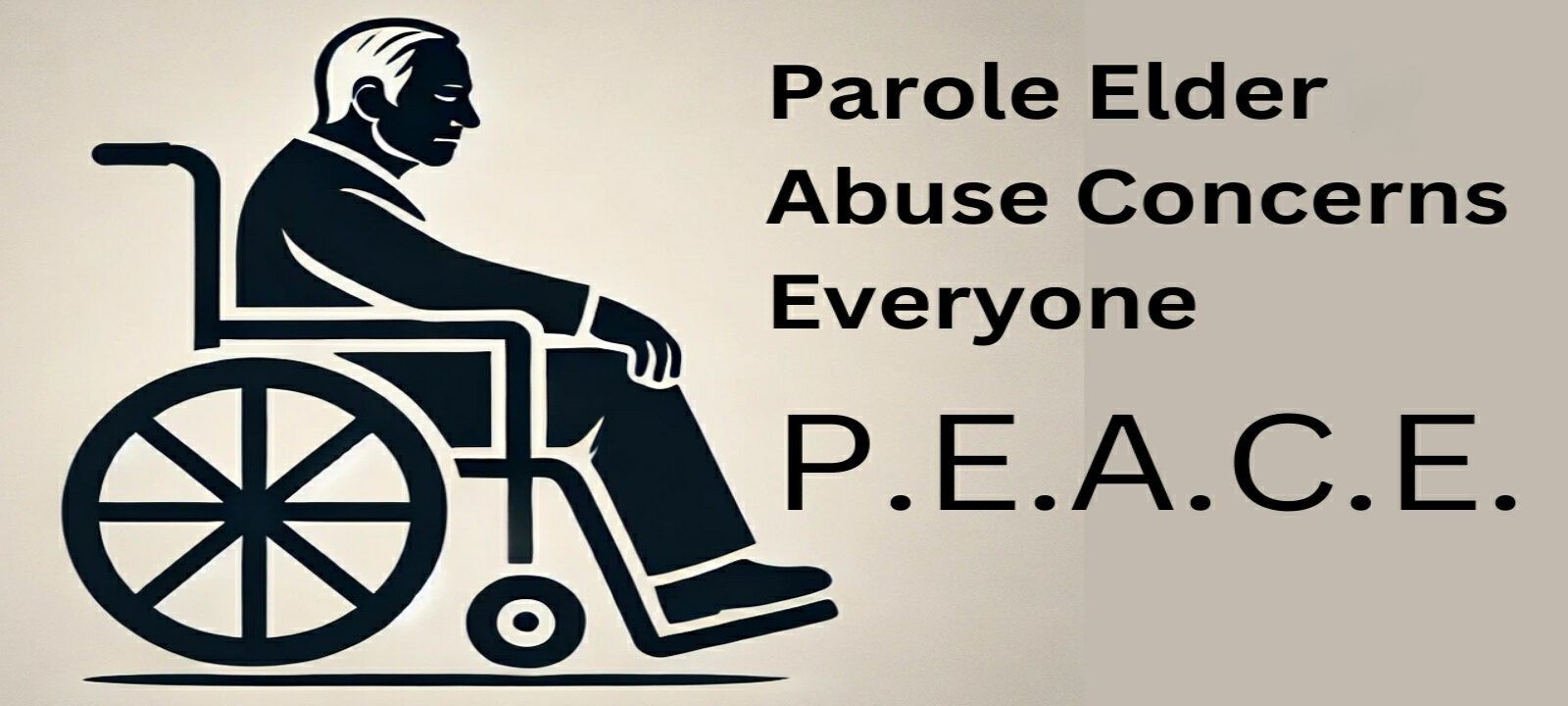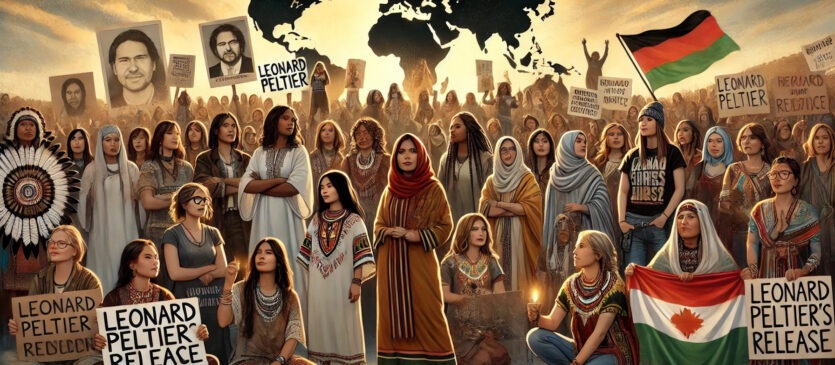International Women’s Day is a celebration of women’s achievements and a rallying cry for gender equity and justice. It is an especially fitting occasion to recognize the women who have championed the cause of Leonard Peltier, a Native American activist whose case became a global symbol of injustice. These women—from attorneys and activists to Nobel Peace Prize laureates—mobilized across decades and continents to demand Peltier’s freedom. Their persistence, compassion, and solidarity exemplify the spirit of International Women’s Day, demonstrating how women’s advocacy can help correct historic wrongs and bring about meaningful change. In the wake of Peltier’s recent clemency, we honor these advocates and reflect on the impact of their efforts.
Leonard Peltier’s Case – An Advocate’s Perspective
Leonard Peltier, an Anishinaabe-Lakota member of the American Indian Movement (AIM), was convicted in 1977 for the deaths of two FBI agents during a 1975 conflict on Pine Ridge Reservation. From the beginning, supporters around the world raised serious doubts about the fairness of his trial. They point to coerced witness testimony, suppressed exculpatory evidence, and other irregularities that occurred during the prosecution (Fighting for Leonard Peltier: My Journey to End an Unauthorized Quasi-Execution – Parole Elder Abuse Concerns Everyone). Amnesty International and numerous legal experts have long argued that political factors influenced his case, labeling Peltier a political prisoner and a victim of miscarried justice (A Hard Knock Radio Conversation: Leonard Peltier’s Commutation with Attorney Jenipher R. Jones | KPFA) (Fighting for Leonard Peltier: My Journey to End an Unauthorized Quasi-Execution – Parole Elder Abuse Concerns Everyone). Despite these concerns, Peltier remained behind bars for nearly five decades, serving two life sentences.
As the years turned into decades, Peltier’s plight garnered support from human rights organizations, Indigenous leaders, and even some of those once opposed to him. Courts acknowledged issues in his case, yet parole was repeatedly denied. By age 80, Peltier had become one of America’s longest-incarcerated Indigenous prisoners, and his health deteriorated severely in prison. He suffered from diabetes and nearly lost his eyesight, conditions worsened by the harsh conditions of a maximum-security penitentiary (A Hard Knock Radio Conversation: Leonard Peltier’s Commutation with Attorney Jenipher R. Jones | KPFA). Advocates decried his continued imprisonment as “a cruel form of psychological torture,” arguing that keeping an elderly, ailing man in prison amounted to an “unauthorized quasi-execution” (Appeal to the First Lady: Clemency for Leonard Peltier – Parole Elder Abuse Concerns Everyone) (Fighting for Leonard Peltier: My Journey to End an Unauthorized Quasi-Execution – Parole Elder Abuse Concerns Everyone). For Native communities, Peltier’s incarceration was not only a personal injustice but also a painful reminder of systemic oppression; as one supporter noted, his case became “a scar on the face of a justice system” that has too often failed Indigenous people (Fighting for Leonard Peltier: My Journey to End an Unauthorized Quasi-Execution – Parole Elder Abuse Concerns Everyone).
Momentum for Peltier’s release grew into a worldwide campaign. Over the years, religious figures, Nobel laureates, and even a former FBI agent involved in the case urged clemency (Appeal to the First Lady: Clemency for Leonard Peltier – Parole Elder Abuse Concerns Everyone). That clemency finally came on January 20, 2025, when President Joe Biden commuted Leonard Peltier’s sentence, citing his advanced age and poor health after 46 years in custody (Leonard Peltier leaves prison after Biden ended his sentence in FBI agents’ killings – OPB). At long last, Peltier was allowed to leave prison, transitioning to home confinement as an elder. This historic decision was a testament to decades of relentless advocacy. On International Women’s Day, it is especially appropriate to recognize that many of the loudest, most persistent voices in that advocacy belonged to women. Below, we profile some of the women—both in the United States and internationally—whose dedication helped make this long-sought justice possible.
Profiles of Women Advocates for Peltier’s Freedom
- Jenipher R. Jones (United States) – Civil Rights Attorney. As Leonard Peltier’s lead counsel, Jenipher Jones spearheaded the legal fight for his freedom (Monday, January 20, 2025 – Special Edition: Biden commutes Leonard Peltier sentence » Native America Calling). Jones is the Managing Attorney of “For the People – A People’s Legal Office,” and she tirelessly navigated administrative appeals and clemency petitions on Peltier’s behalf (A Hard Knock Radio Conversation: Leonard Peltier’s Commutation with Attorney Jenipher R. Jones | KPFA). She often spoke publicly about the injustices in Peltier’s case and the political obstacles his team faced. When clemency was finally granted, Jones rejoiced at a “measure of justice” served after nearly 50 years (Monday, January 20, 2025 – Special Edition: Biden commutes Leonard Peltier sentence » Native America Calling), yet continued to press for full freedom and recognition of Peltier’s rights (A Hard Knock Radio Conversation: Leonard Peltier’s Commutation with Attorney Jenipher R. Jones | KPFA).
- Anita L. Wills (United States) – Activist and Historian. Anita Wills, an Afro-Indigenous historian and prison reform advocate, used her voice to rally support for Peltier as an elder in captivity. A member of the Monacan Indian Nation and author of several books, Wills drew on personal experience as the mother of an incarcerated son to highlight the cruelty of Peltier’s prolonged imprisonment (Appeal to the First Lady: Clemency for Leonard Peltier – Parole Elder Abuse Concerns Everyone) (Appeal to the First Lady: Clemency for Leonard Peltier – Parole Elder Abuse Concerns Everyone). In a powerful open letter to First Lady Jill Biden, Wills described 80-year-old Peltier’s decades behind bars without parole as “a cruel form of psychological torture” and an egregious case of elder abuse in the justice system (Appeal to the First Lady: Clemency for Leonard Peltier – Parole Elder Abuse Concerns Everyone). She implored the First Lady to champion Peltier’s clemency, linking his suffering to the broader history of Indigenous trauma (such as the boarding schools he survived) and urging immediate action (Appeal to the First Lady: Clemency for Leonard Peltier – Parole Elder Abuse Concerns Everyone). Wills’ advocacy underscored the moral urgency of Peltier’s release and situated it within a fight for Indigenous rights and humane treatment of elders.
- Paulette Dauteuil (United States) – Longtime Organizer. Paulette Dauteuil has devoted much of her life to the Leonard Peltier support movement. In the late 1970s, she helped organize Peltier’s legal defense, coordinating support houses and resources for his trial (Committee IN Solidarity for LEONARD PELTIER — Free Leonard Peltier Now). Dauteuil served in leadership roles in the Leonard Peltier Defense Committee and the Jericho Movement (which advocates for political prisoners), and she even has a personal connection: she was married to Peltier’s cousin, the late Robert Robideau, who was acquitted in the same incident for which Peltier was convicted (Monday, January 20, 2025 – Special Edition: Biden commutes Leonard Peltier sentence » Native America Calling). From lobbying Congress for Peltier’s medical care and clemency to keeping his case in the public eye, Dauteuil has been on the front lines of advocacy. Upon news of the commutation, she applauded the Biden Administration for “finally doing the right thing and setting Leonard free,” calling it a “wonderful homecoming” for someone who endured so much (Monday, January 20, 2025 – Special Edition: Biden commutes Leonard Peltier sentence » Native America Calling). Her decades of dedication helped sustain the movement that eventually won Peltier’s release.
Rigoberta Menchú Tum (Guatemala) – Indigenous Rights Activist, Nobel Laureate (1992). Rigoberta Menchú, a Maya K’iche’ activist, has for years leveraged her international stature to demand justice for Peltier. As a Nobel Peace Prize winner renowned for defending Indigenous communities, she recognized Peltier as a fellow Indigenous rights figure and was among the earliest global voices calling for his freedom (Walkers seek freedom for Peltier | Green Left). Menchú visited Peltier in prison and spoke out on his behalf, asserting that he had “paid with 25 years of his life” by the year 2000 and urging President Clinton to grant clemency (LPDC | Clemency Campaign | Fall 2000 | The Case of Leonard Peltier). In 2015, she joined other Nobel laureates in a formal clemency appeal to President Obama, arguing that after so many decades, justice and reconciliation required Peltier’s release (Leonard Peltier Clemency_Nov2015). Her steadfast advocacy linked the plight of Indigenous peoples in Guatemala with Indigenous struggles in the U.S., embodying a solidarity that crossed borders and gained worldwide attention for Peltier’s case. (Image: Rigoberta Menchú, center, marches in Guatemala City to commemorate the Indigenous Rights Accord, March 2009.)
- Mairead Corrigan Maguire (Northern Ireland) – Peace Activist, Nobel Laureate (1976). Mairead Maguire, who won the Nobel Peace Prize for her work in Northern Ireland, extended her peace advocacy to Peltier’s situation. Maguire has long seen Peltier’s imprisonment as a human rights issue, speaking of the need for healing and reconciliation. She lent her name to high-profile clemency efforts; notably, Maguire co-signed the 2015 letter from Nobel Peace laureates urging President Obama to release Peltier (Leonard Peltier Clemency_Nov2015). Alongside peers like Menchú, Desmond Tutu, Shirin Ebadi, and others, she argued that “after serving 40 years in jail, justice has been served and Leonard Peltier should be released.” (Leonard Peltier Clemency_Nov2015) (Leonard Peltier Clemency_Nov2015) Her advocacy emphasized mercy and the importance of resolving conflicts without bitterness. Maguire’s involvement brought a European voice to the campaign and reinforced that the call for Peltier’s freedom was a truly international cause.
- Mary Robinson (Ireland) – Stateswoman and Human Rights Champion. Mary Robinson, former President of Ireland and United Nations High Commissioner for Human Rights, emerged as a prominent supporter of Peltier’s clemency. With her background in law and human rights, Robinson viewed Peltier’s case as a grave injustice. During her tenure at the U.N., she formally wrote to the U.S. President urging clemency for Peltier (The Case of Leonard Peltier | Statements of Support), and she continued to speak out even after leaving office. For decades, Robinson – often in concert with fellow global leaders like Nelson Mandela – lobbied for Leonard Peltier to be pardoned (Leonard Peltier granted clemency). She saw his prolonged imprisonment as a “stain” on the U.S. justice system that needed to be remedied. Robinson’s authoritative voice and moral clarity helped validate Peltier’s supporters’ claims on the world stage, framing his release as not just an Indigenous issue, but as a matter of fundamental human rights and justice.
Bianca Jagger (Nicaragua) – Human Rights Advocate. Bianca Jagger, the Nicaraguan-born human rights activist and former actress, has been a vocal advocate for social justice causes, including Leonard Peltier’s freedom. Jagger used her public platform to shine a light on Peltier’s case, often speaking at events and through media to demand his release. In 2008 she joined dozens of notable figures in signing a petition asking for Peltier’s clemency, alongside artists and celebrities worldwide (International : Native American activist 33 years in jail | An Phoblacht). She framed Peltier’s imprisonment as a moral issue, noting the troubling questions about his conviction and the harshness of punishing a man who has always maintained his innocence. When news of Peltier’s commutation broke in 2025, Bianca Jagger celebrated the development, calling it long overdue. Her persistent involvement exemplified how individuals outside of government – especially women leaders in civil society – can keep human rights issues alive in the public consciousness. (Image: Bianca Jagger in 2001. As a goodwill ambassador and advocate, she campaigned for human rights causes globally (International : Native American activist 33 years in jail | An Phoblacht).)
Shirin Ebadi (Iran) – Lawyer and Nobel Laureate (2003). Shirin Ebadi, Iran’s first female Nobel Peace Prize winner, is known for her courageous advocacy of democracy and human rights. She extended her concern to Peltier’s case as part of her broader fight against injustice. Ebadi was one of the Nobel laureates who joined forces to support Peltier’s clemency bid, lending her signature and credibility to the 2015 Nobel Women’s Initiative letter that urged the U.S. government to free him (Leonard Peltier Clemency_Nov2015). As a former judge who had been imprisoned in Iran for her views, Ebadi identified with Peltier’s status as a prisoner of conscience. She frequently highlighted the “healing and reconciliation” that Peltier’s release would represent, not only for him but for the integrity of the justice system (Leonard Peltier Clemency_Nov2015). Ebadi’s participation underscored that Peltier’s human rights mattered far beyond American borders – to defenders of justice even in countries like Iran, his freedom became a symbolic goal.
Tawakkol Karman (Yemen) – Journalist and Nobel Laureate (2011). Tawakkol Karman, who earned the Nobel Peace Prize for her leadership in Yemen’s pro-democracy movement, brought her passion for freedom of expression to Peltier’s cause. Karman joined fellow laureates in advocating for Peltier, emphasizing that freeing political prisoners is essential to any democracy’s moral credibility. In the clemency appeal to President Obama, she and others cited Peltier’s unjust 40-year imprisonment and appealed to the U.S. to turn the page on this historical wrong (Leonard Peltier Clemency_Nov2015). Karman’s voice, coming from the Middle East, reinforced the truly global reach of Peltier’s support. She often speaks about the interconnectedness of struggles for justice; in Peltier’s case, she saw an Indigenous elder’s plight as part of the worldwide fight against oppression. Her advocacy, rooted in nonviolent resistance and compassion, helped maintain international pressure to do right by Peltier.
- Yoko Ono (Japan) – Artist and Peace Activist. As a prominent artist and widow of John Lennon, Yoko Ono has long been associated with peace activism. She lent that legacy to the movement to free Leonard Peltier. Ono joined public calls for Peltier’s release, adding her name to petitions and open letters that demanded clemency (International : Native American activist 33 years in jail | An Phoblacht). In the late 1990s and 2000s, she stood alongside activists who argued that Peltier’s continued imprisonment was a miscarriage of justice and a symbol of the mistreatment of Indigenous peoples. Ono’s involvement brought considerable media attention, bridging the gap between pop culture and political activism. In recent years, as Peltier’s health worsened, Ono reiterated the urgency of granting him relief on humanitarian grounds. Her consistent solidarity — echoing the peace-and-love ethos she famously championed — provided moral support to Peltier and reminded the public that compassion must be at the heart of justice.
Conclusion
The stories of these women underscore the power of international women’s advocacy. Individually, each of these advocates brought unique strengths — legal expertise, moral authority, personal passion, and global awareness — to the fight for Leonard Peltier. Collectively, they formed a chorus for justice that refused to be silenced. Their efforts, along with those of Peltier’s many other supporters, ultimately helped achieve what once seemed impossible: after 46 years, Leonard Peltier is no longer behind bars. His long-awaited release to home confinement is more than just the freedom of one man; it is “a measure of justice that has long evaded so many Native Americans for so many decades,” as U.S. Interior Secretary Deb Haaland observed (Monday, January 20, 2025 – Special Edition: Biden commutes Leonard Peltier sentence » Native America Calling). It represents an acknowledgment of Indigenous rights and sovereignty, an overdue act of mercy for an elder, and a step toward healing historical wounds.
Yet, the work of these advocates is not finished. Peltier’s case has shone a harsh light on systemic problems — from the treatment of elders in prison to the persistence of political prisoners and the need for reform in trial and parole processes. Even as we celebrate this victory, Peltier remains under home confinement, and many others around the world continue to languish unjustly behind bars. The women honored here remind us that sustained activism can bend the arc of history toward justice, but we must continue that effort. Their legacy calls on us to support other political prisoners, to demand fairness for elderly and vulnerable inmates, and to ensure that no one is left to endure decades of imprisonment under questionable circumstances.
On this International Women’s Day, P.E.A.C.E. salutes Jenipher Jones, Anita L. Wills, Paulette Dauteuil, Rigoberta Menchú, Mairead Corrigan Maguire, Mary Robinson, Bianca Jagger, Shirin Ebadi, Tawakkol Karman, Yoko Ono, and countless other women who stood up for Leonard Peltier. Their courage and commitment exemplify how women advocates are often the heart and soul of movements for justice. In freeing Leonard Peltier, they have not only given an elderly man the chance to go home; they have also affirmed the principle that compassion and truth can prevail over indifference and injustice. It is a lesson and inspiration we carry forward as we continue the fight for a more just and humane world.
Sources: Leonard Peltier Defense Committee and P.E.A.C.E. archives; statements and letters from Nobel Women’s Initiative and human rights organizations; media interviews and coverage of Peltier’s case and clemency (Indian Country Today, Native America Calling, OPB, The Guardian); Peltier’s official support group communications (Fighting for Leonard Peltier: My Journey to End an Unauthorized Quasi-Execution – Parole Elder Abuse Concerns Everyone) (Appeal to the First Lady: Clemency for Leonard Peltier – Parole Elder Abuse Concerns Everyone) (Monday, January 20, 2025 – Special Edition: Biden commutes Leonard Peltier sentence » Native America Calling) (Walkers seek freedom for Peltier | Green Left) (Leonard Peltier Clemency_Nov2015) (International : Native American activist 33 years in jail | An Phoblacht) (Monday, January 20, 2025 – Special Edition: Biden commutes Leonard Peltier sentence » Native America Calling) (Leonard Peltier leaves prison after Biden ended his sentence in FBI agents’ killings – OPB) (Monday, January 20, 2025 – Special Edition: Biden commutes Leonard Peltier sentence » Native America Calling).



Leave a Reply